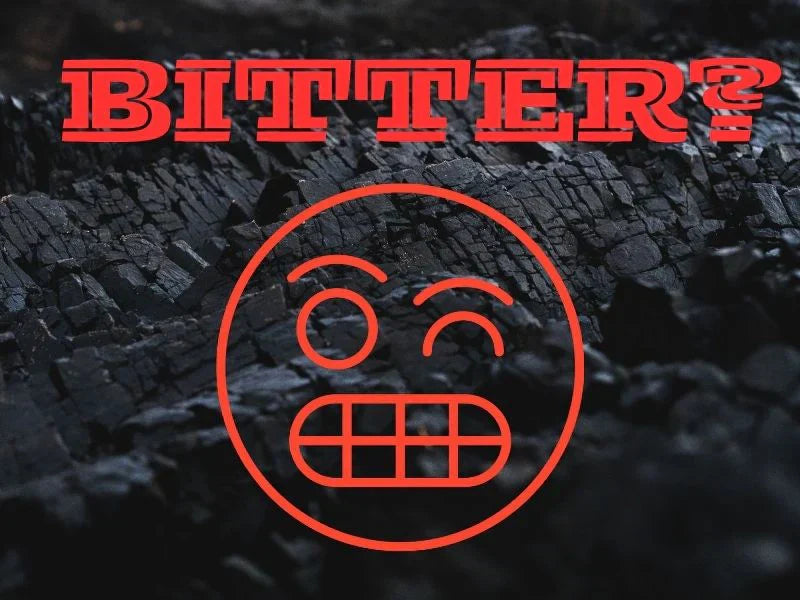Why's Your Coffee Bitter? And Can That Be, Like, a Good Thing?
Okay, let's be real. That first sip of coffee? It's often the kickstart to our whole day. Whether you're chasing that morning buzz, having a quiet moment, or just catching up with friends, coffee's a big deal. But lurking in that dark, delicious liquid is often a taste that can be a bit… well, bitter. Some of us are all about that bold, edgy flavor, while others totally cringe. So, what's up with the bitterness, and can it actually be something we want in our cup? Let's spill the beans!
Why Does Your Coffee Taste Bitter? The Science-y (But Simple) Bit

That bitterness you're tasting in your morning coffee largely comes from some sneaky chemicals called chlorogenic acids that are chilling in raw green coffee beans. When those beans hit the heat during the coffee roasting process – especially if they get a really dark tan (hello, dark roast coffee!) – these acids break down into even more bitter stuff like lactones and phenylindanes. Basically, the darker the roast, the more those bitter baddies show up, giving you that intense, sometimes almost burnt, taste.
But it's not just roasting. Other things can make your coffee bitter too:
- Over-extraction: This is when your water hangs out with the coffee grounds for too long, pulling out way too much of the bitter stuff. Think of it like steeping tea for ages – it just gets stronger and harsher. This often happens with really fine grind coffee or brewing methods that take their sweet time.
- Water Temperature: If your water's too hot, it can get a bit aggressive and yank out bitter compounds faster.
- Coffee Bean Type: Some beans are naturally more bitter. Robusta coffee beans, for instance, have more caffeine (which is also bitter!) and other bitter notes compared to their smoother cousin, Arabica coffee beans. That's why Robusta often shows up in espresso – it gives it that killer crema and strong flavor.
- How You Brew: Different coffee brewing methods can either amp up or chill out the bitterness. Your French press coffee, with its longer soak time, can be pretty bitter if you're not careful, while pour over coffee gives you more control to avoid that.
Can Bitterness Actually Be a Good Thing? The Secret Sauce!
Okay, this is where it gets interesting. While nobody wants coffee that's just bitter, a little bit of that taste is actually super important for a truly great cup. Think of it like the backbone or the bassline in a song – it gives your coffee structure and depth. When your coffee is roasted and brewed just right, bitterness can:
- Add Layers: A balanced bitterness can bring out other cool flavors, like chocolate, nutty notes, or even earthy hints. It stops your coffee from tasting flat or too sugary.
- Give a Nice Finish: A touch of bitterness can leave a clean, lingering taste that just feels good and adds to the whole experience.
- Hint at Freshness: Sometimes, a really subtle bitterness can even mean your coffee was roasted super recently, as some good compounds pop up early in the roasting game.
It's all about finding that sweet spot (or bitter spot, in this case!). Too much bitterness and it just overpowers everything. But when it blends in nicely, it makes the whole cup sing. That's the sign of a truly gourmet coffee experience.
Bitter vs. Sour vs. Good Acidity: What's the Deal?
Lots of people get these confused, but bitter, sour, and that lovely "pleasant acidity" are totally different vibes in your coffee cup.
- Sourness in coffee usually means something went wrong – either you under-extracted it, or the beans weren't great to begin with. It's that bright, sometimes puckering taste that can make your mouth feel fuzzy, like biting into a super tart lemon or even tasting vinegar. This happens when you haven't pulled out enough of the good stuff, leaving the overly acidic notes to dominate. Think of an unripe fruit.
- Bitterness, as we've already chatted about, is that deeper, often lingering taste that comes from over-extraction or a very dark roast. It can feel strong, a bit rough, or even medicinal if it's too much.
- Pleasant Acidity, on the other hand, is a totally desirable trait in coffee! It's bright, vibrant, and adds a lively zest to the cup. This kind of acidity can taste like fresh fruit (berries, citrus), floral notes, or even wine-like. It's what makes a light roast coffee feel zippy and complex, and it's a sign of a high-quality bean and proper extraction. It's not the pucker-sourness of under-extraction, but rather a refreshing, nuanced zing that elevates the entire flavor profile.
So, when your coffee tastes sour, it's often a sign of a brewing mishap (too fast, water not hot enough) or the beans themselves being a bit off. Bitter coffee could be from over-extraction, water that's too hot, or just a super dark roast you might not be into. But that beautiful, bright acidity? That's a sign of a wonderfully crafted cup, and a taste to savor!
Knowing the difference means you can totally up your home brewing game. So next time you're sipping, really pay attention to what you're tasting. That touch of bitterness, balanced with other notes, might just be the secret ingredient to your perfect cup. Happy brewing!

